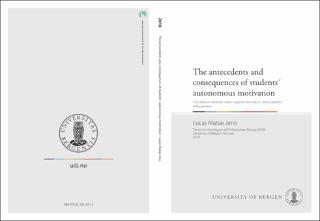The antecedents and consequences of students´ autonomous motivation. The relation between need-support, motivation, and academic achievement
Doctoral thesis
Permanent lenke
https://hdl.handle.net/1956/17502Utgivelsesdato
2018-02-16Metadata
Vis full innførselSamlinger
Sammendrag
Higher education has traditionally rested on teacher-centred education. Recently, there has been a shift towards learner-centred education. Innovative teaching tools, active teaching methods, and teachers that encourages a deep approach to learning, are examples of how to facilitate learner-centred education. Central to learner-centred education is increasing student motivation for learning. Moreover, recent systematic reviews and meta-analyses suggest that learner-centred education, compared to teacher-centred education, increase student achievement. Guided by the framework of Self-Determination Theory, this thesis investigates different antecedents for student motivation, and how in turn, autonomous motivation relates to achievement. It is hypothesised that the extent that the environment (i.e., teacher, innovative teaching tools, active teaching methods) promotes a sense of choice and volition in the learning activity, a sense of optimal challenge and feedback, and a sense of caring and nurture, will increase student autonomous motivation and achievement. Three independent studies were conducted and written up as three papers. Paper I is a national representative cross-sectional investigation of biology students´ prospective achievements and dropout intentions. Results from a Structural Equation Model show support for the proposed hypotheses. Moreover, multi-group analyses show that there are significant differences for level (i.e., BA vs MA) for four paths, but are invariant across genders. Specifically, we found need-support, relatedness, and intrinsic aspiration to be positive predictors of perceived competence and autonomous motivation. Perceived competence and autonomous motivation are positive predictors of achievement and negative predictors of dropout intentions. Extrinsic aspiration is a negative predictor of achievement and a positive predictor of controlled motivation. Controlled motivation is a positive predictor of dropout intentions. Paper II concerns a randomised experiment testing the effect of a mobile-application tool to identify species. Students in the mobile-application condition, relative to students using a traditional textbook, scored higher on intrinsic motivation, perceived competence, and achievement. A path-analysis shows that the mobile-application positively predicts intrinsic motivation and perceived competence. Intrinsic motivation in turn, positively predicts achievement. An indirect effect of the mobile-application to achievement through intrinsic motivation was found. Paper III is a quasi-experiment testing the effect of Team-Based Learning (TBL) relative to traditional lecture-classes. The study is a one-group pre-test/post-test design. Measurement after four weeks of lectures and then after four weeks of TBL shows that the students increased their intrinsic motivation, identified regulation, external regulation, perceived competence, engagement, autonomy-support, need-satisfaction, and perceived learning. The students decreased in amotivation from pre-test to post-test as a function of TBL. A path-analysis using the change scores shows that increases in intrinsic motivation, identified regulation, and perceived competence positively predict engagement, which in turn, positively predicts perceived learning. In conclusion, the results show that active learning, compared to passive learning, is positively related to achievement. However, the findings also show that it is important to consider the underlying motivational processes that either support or thwart student autonomous motivation. That is, active learning promotes autonomous motivation and increases learning when the students´ basic psychological needs for autonomy, competence, and relatedness are supported. In accordance with Self-Determination Theory, a socio-context could be perceived as informational (need-supportive), controlling (need-thwarting), or amotivational (incompetence), thus teachers and institutions are recommended to consider the need-supportive vs need-thwarting elements within learner-centred approaches. The results from this thesis contribute to the knowledge on what increases student autonomous motivation and how active learning methods impact student motivation. Specifically, the use of a prominent metatheory of motivation allows for an analysis of which factors facilitate motivation and what the consequences might be. The use of diverse student samples, study design, and statistical analyses provide strong support for the external validity of the thesis.
Består av
Paper I: Jeno, L. M., Danielsen, A. G., & Raaheim, A. A prospective investigation of students´ achievement and dropout in higher education: A Self-Determination Theory approach. Full text not available in BORA.Paper II: Jeno, L. M., Grytnes, J.-A., & Vandvik, V. (2017). The effect of a mobile-application tool on biology students' motivation and achievement in species identification: A Self- Determination Theory perspective. Computers & Education, 107, 1-12. The article is available in the main thesis. The article is also available at: https://doi.org/10.1016/j.compedu.2016.12.011
Paper III: Jeno, L. M., Raaheim, A., Kristensen, S. M., Kristensen, K. D., Hole, T. N., Haugland, M. J., & Mæland, S. (2017). The relative effect of Team-Based Learning on motivation and learning: A Self-Determination Theory perspective. CBE-Life Sciences Education, 16(4), 1-12. The article is available at: http://hdl.handle.net/1956/17501
